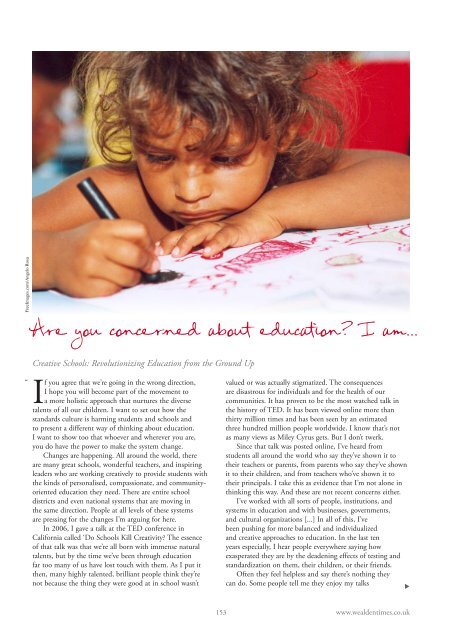Wealden Times | WT171 | May 2016 | Restoration & New Build supplement inside
Wealden Times - The lifestyle magazine for the Weald
Wealden Times - The lifestyle magazine for the Weald
You also want an ePaper? Increase the reach of your titles
YUMPU automatically turns print PDFs into web optimized ePapers that Google loves.
FreeImages.com/Angelo Rosa<br />
Are you concerned about education? I am...<br />
Creative Schools: Revolutionizing Education from the Ground Up<br />
“<br />
If you agree that we’re going in the wrong direction,<br />
I hope you will become part of the movement to<br />
a more holistic approach that nurtures the diverse<br />
talents of all our children. I want to set out how the<br />
standards culture is harming students and schools and<br />
to present a different way of thinking about education.<br />
I want to show too that whoever and wherever you are,<br />
you do have the power to make the system change.<br />
Changes are happening. All around the world, there<br />
are many great schools, wonderful teachers, and inspiring<br />
leaders who are working creatively to provide students with<br />
the kinds of personalised, compassionate, and communityoriented<br />
education they need. There are entire school<br />
districts and even national systems that are moving in<br />
the same direction. People at all levels of these systems<br />
are pressing for the changes I’m arguing for here.<br />
In 2006, I gave a talk at the TED conference in<br />
California called ‘Do Schools Kill Creativity? The essence<br />
of that talk was that we’re all born with immense natural<br />
talents, but by the time we’ve been through education<br />
far too many of us have lost touch with them. As I put it<br />
then, many highly talented, brilliant people think they’re<br />
not because the thing they were good at in school wasn’t<br />
valued or was actually stigmatized. The consequences<br />
are disastrous for individuals and for the health of our<br />
communities. It has proven to be the most watched talk in<br />
the history of TED. It has been viewed online more than<br />
thirty million times and has been seen by an estimated<br />
three hundred million people worldwide. I know that’s not<br />
as many views as Miley Cyrus gets. But I don’t twerk.<br />
Since that talk was posted online, I’ve heard from<br />
students all around the world who say they’ve shown it to<br />
their teachers or parents, from parents who say they’ve shown<br />
it to their children, and from teachers who’ve shown it to<br />
their principals. I take this as evidence that I’m not alone in<br />
thinking this way. And these are not recent concerns either.<br />
I’ve worked with all sorts of people, institutions, and<br />
systems in education and with businesses, governments,<br />
and cultural organizations [...] In all of this, I’ve<br />
been pushing for more balanced and individualized<br />
and creative approaches to education. In the last ten<br />
years especially, I hear people everywhere saying how<br />
exasperated they are by the deadening effects of testing and<br />
standardization on them, their children, or their friends.<br />
Often they feel helpless and say there’s nothing they<br />
can do. Some people tell me they enjoy my talks<br />
<br />
153 www.wealdentimes.co.uk


















